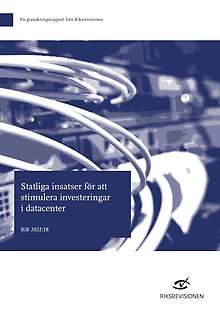Poorly prepared initiative on reduced energy tax for data centres
To attract investment, the energy tax for data centres was greatly reduced in 2017. The Swedish National Audit Office’s audit shows that the decision was based on documentation with clear deficiencies, in which neither the companies’ nor society’s needs were addressed. As yet no evaluation has been carried out.

Photo: Tproduction
The reduction of the energy tax for ‘data centres’ was introduced to increase Sweden’s attractiveness in relation to, among others, our Nordic neighbouring countries. The purpose was to contribute to the industrial policy objective to “strengthen Swedish competitiveness and create prospects for more jobs in more and expanding companies.”
The reduction is a tax policy measure with an industrial policy orientation, which at the same time has an energy policy significance. The Swedish National Audit Office (Swedish NAO) has audited planning, implementation and follow-up.
The audit shows that the Government did not take into account the energy policy objectives, despite the fact that it was well-known that data centres are major energy users and would subject the electricity system to significant strain.
For example, the support was not made conditional on requirements for energy efficiency or recovery of waste heat from the data centres. Nor has there been any effort to exploit the flexibility that data centres could bring to the energy system.
“In the audit, data centre companies state that they can increase the pace of work on energy efficiency and that it would have mattered if the State had linked the reduction of the energy tax with environmental and energy issues. However, potential investors have not been informed about the energy policy objectives or how they could contribute,” says Dimitrios Ioannidis, Project Leader for the audit.
The objectives of the initiative were limited to the industrial policy area. Here, too, the audit points to a number of shortcomings. According to the Swedish NAO’s assessment there is, for example, a lack of well-founded documentation for identifying which companies or types of data centres should be able to take part of the reduced energy tax.
Until 2021, the reduction has so far meant a tax loss of just over SEK 1.3 billion. However, since companies can request reduction within three years from the time the electricity is consumed, this figure might increase. In total, 80 companies have taken part in the reduction. This can be compared with 235, which was the forecast in the Government documentation. This may have led to fewer new jobs and less economic growth than would otherwise have been possible. The reduction has largely gone to a few major companies.
The Swedish NAO also notes that in the investigations carried out by the Swedish Tax Agency, it remains difficult to determine such matters as who has access to the equipment, what business is being conducted and the scope of the electricity consumption.
In addition, the Government has not made any follow-up, or analysed what positive and negative consequences the reduced energy tax has had on different types of data centres. Nor has the Government set positive and negative consequences against each other, including tax loss, to be able to review the reduction.
“The reduction of the energy tax could have been more effective if the Government had prepared the measure and coordinated between different societal objectives. The reduction should also have been evaluated in retrospect, not least in light of Sweden’s energy policy challenges and the continuing difficulties that the Swedish Tax Agency faces in its investigations,” says Auditor General Helena Lindberg.
Recommendations in brief
The Swedish National Audit Office’s recommendations to the Government include:
- evaluating the impact of the reduction
- linking the reduction of the energy tax for data centres to the energy policy objectives.
See the report for full recommendations.
Press contact: Olle Castelius, phone: +46 8-5171 40 04.
Presskontakt: Olle Castelius , telefon: 08-5171 42 06.
Share in social media and by e-mail
Contact form
Send your questions or comments via the form below and we will make sure that they reach the right member of staff. Please state if your question concerns the information on this particular page.


